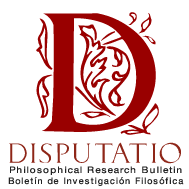Wolfgang Kienzler
Friedrich–Schiller–Universität, Jena, Germany | wolfgang.kienzler@uni-jena.de
Received: 22-April-2018 | Accepted: 21-November-2018 | Published: 31-December-2018
Disputatio [Dec. 2018], Vol. 7, No. 8, a007 | DOI: 10.5281/zenodo.2550986
Article | [EN] | Full Text | Statistics | Copyright Notice [es] | Vol. 7 No. 8
Corrigendum: The current version of this article contains corrections by the author introduced on June 9, 2019, concerning the abstract; pages: 1, 2, 3, 4, 5, 6, 10, 11, 12, 13, 14, 15, 16, 17; footnotes: 3, 4, 11, 41, 42, 46, 48; and acknowledgements.
How to cite this article:
Kienzler, Wolfgang (2018). «Hume’s best Book: Why Hume called his Enquiry concerning the Principles of Morals ‘incomparably the best’ of everything he wrote». Disputatio. Philosophical Research Bulletin 7, no. 8: a007.
Abstract | In this article, I explore why Hume regarded his Enquiry concerning the Principles of Morals “incomparably the best” of everything he wrote, while this judgement of his is not confirmed at all by the rankings in popularity of his works. Hume’s main reason for this judgment was the conviction that regarding the principles of morals he had reached the most satisfying, systematical and evidently true results of all his work. I argue that the general rejection of Hume’s own judgement is based on prejudices that fail to take into account the way Hume himself thought that his works should be read. Hume’s wish to explain his “new and distinct notion of moral philosophy” led him to introduce many changes to this Enquiry even until few days before his death. Hume’s intention were to guide the reader thus to an understanding of his system of ethics, for he had become aware of the fact that, instead of using exact definitions, he should rely on natural descriptions and good examples to make his main point come out more clearly. Hume’s appeal to the obvious as a key to understanding seems to suggest that the Scottish philosopher was indeed “very far away from most of contemporary analytic philosophy.”
Keywords | Morals · Scepticism · Systematicity · Description · Obviousness.
![]()
El mejor libro de Hume: por qué Hume llamó su Investigación sobre los principios de la moral «incomparablemente lo mejor» de toda su obra
Resumen | En este artículo exploro por qué Hume consideró su Investigación sobre los principios de la moral «incomparablemente lo mejor» de todo lo que escribió, mientras que este veredicto suyo no es confirmado en absoluto por el orden en popularidad de sus obras. La razón principal de Hume de esta evaluación era la convicción de que, en cuanto a los principios de la moral, él había alcanzado los resultados más satisfactorios, sistemáticos y evidentemente verdaderos de toda su obra. Yo arguyo que el rechazo general del juicio del propio Hume está basado en prejuicios que no toman en cuenta cómo él mismo pensó que su obra se debería leer. El deseo de Hume era guiar al lector de esta manera a una comprensión de su sistema de ética, ya que se había dado cuenta de que, en lugar de usar definiciones exactas, él debería confiar más bien en la descripción natural y en buenos ejemplos para aclarar su punto. La apelación de Hume a lo obvio como clave para la comprensión parece sugerir que el filósofo escocés estaba, de hecho, «muy alejado de la mayor parte de la filosofía analítica contemporánea».
Palabras Clave | Moralidad · Escepticismo · Sistematicidad · Descripción · Obviedad.
References
Baier, Annette C (2008). “Enquiry concerning the Principles of Morals: Incomparably the Best?” in: A Companion to Hume, E. S. Radcliffe, ed., Malden, MA and Oxford: Blackwell, pp. 293–320.
Hume, David (1748). Philosophical Essays concerning Human Understanding, London: Millar [PEHU]; reprinted: Hildesheim: Olms, 1986. from the 1768 edition titled Enquiry concerning Human Understanding. [EHU]
Hume, David (1751). An Enquiry concerning the Principles of Morals, London: Millar.
Hume, David (1882). The Philosophical Works, four volumes [EPM]; T.H. Green and T.H. Grose, eds., New Edition, London 1882, reprinted: Aalen: Scientia, 1964. [GG]
Hume, David (1888). Enquiries concerning Human Understanding and concerning the Principles of Morals [SB]; L.A. Selby–Bigge, ed., Oxford: Clarendon; third edition, P.H. Nidditch, ed., Clarendon: Oxford, 1975.
Hume, David (2006). An Enquiry concerning the Principles of Morals [CE]; The Clarendon Edition of the Works of David Hume, T.L. Beauchamp, ed., Oxford. Clarendon, 1998; Paperback Edition.
Hume, David (1998). An Enquiry concerning the Principles of Morals [SE]; Oxford Philosophical Texts. The complete editions for students, T.L. Beauchamp, ed., Oxford. Oxford University Press.
The Letters of David Hume [GL]; J.Y.T. Greig, ed., two volumes, Oxford. Clarendon, 1932.
© The author(s) 2018. This work, published by Disputatio [www.disputatio.eu], is an Open Access article distributed under the terms of the Creative Commons License [BY–NC–ND]. The copy, distribution and public communication of this work will be according to the copyright notice. For inquiries and permissions, please email: boletin@disputatio.eu.
